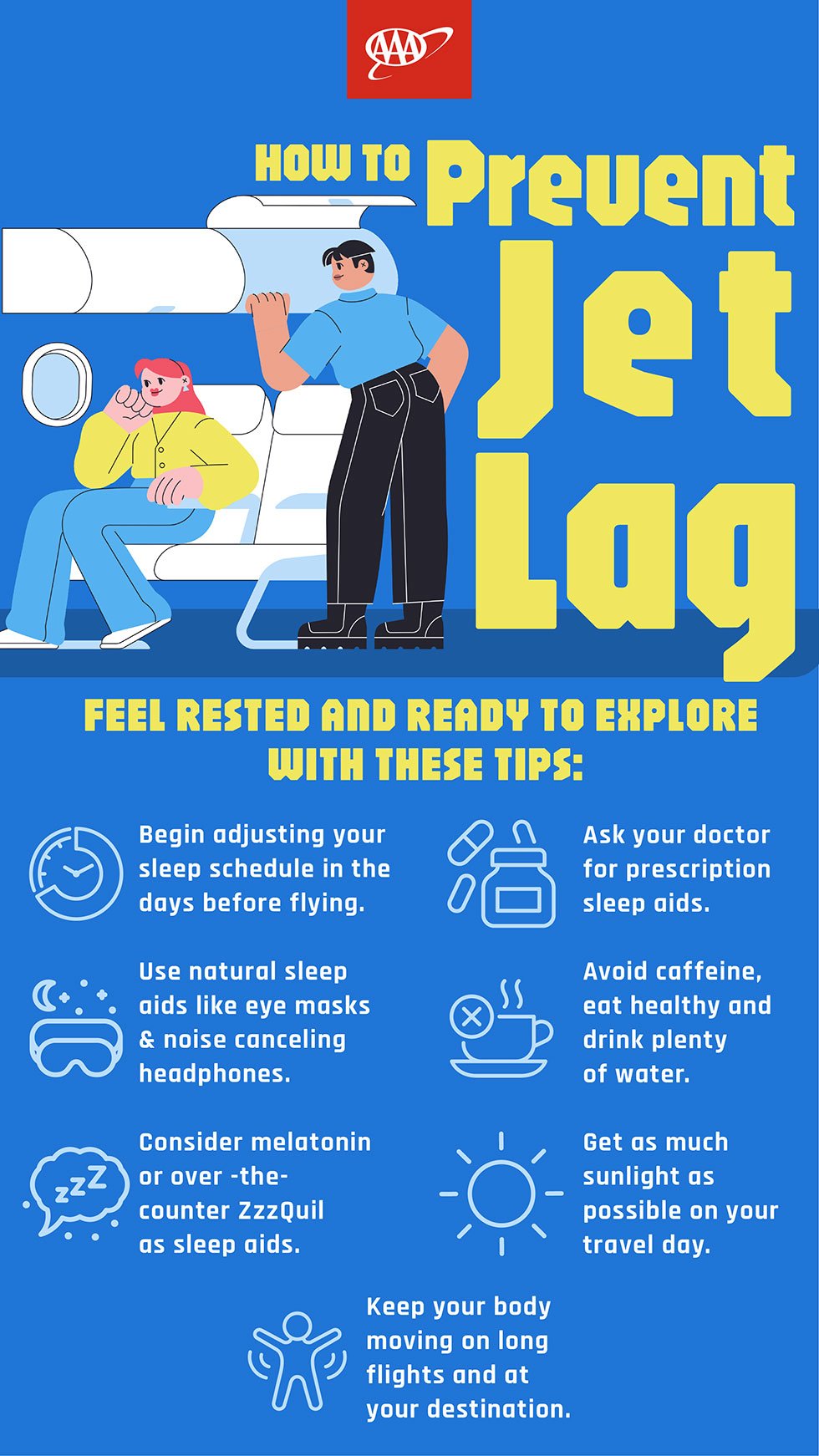

It is hard to enjoy your vacation when you feel tired, irritable, anxious, or have an unsettled stomach. Jet lag is the disturbance of the body's natural circadian rhythms when crossing two or more time zones, so that the physical expectation of day and night mismatch with the reality. Jet lag is often worse when you fly east rather than west. The symptoms may be different for each person regardless of age and health conditions and there is no single response or remedy.
According to Mayo Clinic, jet lag recovery takes one day per time zone crossed. However, with these tools you can help prevent jet lag and arrive at your destination rested and ready to explore.

Reorient your circadian rhythm starting a few days in advance
The Cleveland Clinic recommends that you set your clock to your new time zone before you fly. Start sleeping an hour later each night if you are flying west. If you are flying west to east, go to bed earlier and wake up earlier. Once you arrive at the destination, stay up in the new time zone to avoid the urge to nap during the day.
Use natural sleep aids
Noise cancellation headphones, eye masks, earplugs, white noise machines, and red light sleep therapy devices can help you sleep better at your new location.
Some hotels assist travelers with jet lag also. COMO Metropolitan Singapore’s Sleep Dreams package includes SleepHub sound technology and AirPod hydroxy mild hyperbaric wellness devices, which allows users to receive 50% more oxygen than breathing on their own. In addition, guests are offered easily digestible dishes, and COMO Shambhala Sleep Essential oil, balm, and linen spray
In Australia and New Zealand, Hyatt Hotels have rolled out a holistic sleep experience and exclusive offers designed to help guests wind down, stress less, and enjoy a refreshing night’s sleep
Some travelers prefer melatonin supplements, ZzzQuil, prescription sleep aids, Valium, and muscle relaxants to help sleep, reduce anxiety, and muscle spasms caused by sitting on long flights. Natural supplements such as Flight Armor also claim to help combat jet lag and the risk of blood clots. Always check with your doctor before taking any medications.

Go with the clock for meal times and incorporate smaller nutritious meals
Eating healthy and avoiding caffeine and alcohol, especially in air where you can dehydrate faster, can help prevent jet lag. Instead, drink lots of water and add electrolytes. Eating eggs induces wakefulness. And leafy vegetables, cherries, and quinoa help balance the body’s minerals. Qantas is taking the initiative to serve dishes that promote the brain’s production of tryptophan (that helps sleep), found in fish, chicken, fast-acting carbohydrates, soups, and milk-based desserts onboard.
InterContinental Hotels & Resorts offer complimentary access to Timeshifter at select properties. The app creates personalized mitigation plans for travelers, recommending optimal sleep, wake times, exposure to daylight, and caffeine intake to minimize the effects of jet lag. A selection of nutritious, science-based dishes designed to combat energy slumps by providing essential macronutrients and hydration is also available.
Get some sunlight
Make an effort to expose yourself to as much natural light as possible from sunrise to sunset. Sun exposure is the most powerful tool to regulate sleep-wake cycle. You can apply this strategy during the flight to help you adjust to the new time zone before you reach your destination.
On the plane, artificial light sources such as reading lights or television screen can also help you stay awake. If you have trouble falling asleep, F1 performance coach who is also pursuing a Doctorate in Jet Lag Research, Tom Clark, recommends blue light-blocking glasses to lower stress hormones and improve sleep quality.
Exercise regularly
If you wake up early, go to the hotel’s fitness center, take a walk outside, ride a bike around town, and get your body moving. Most travelers find exercise helps them acclimate and keeps them healthy on the road.
On longer flights, try to move around the cabin when possible, practice deep breathing, and stretch your arms and legs regularly while seated.
No one remedy may cure jet lag, but if you try a few of them, you may be able to find what’s best for you.

